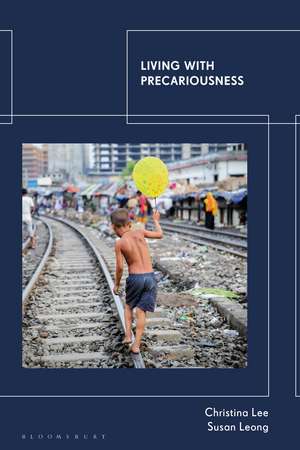Living with Precariousness
Editat de Dr Christina Lee, Susan Leongen Limba Engleză Hardback – 12 iul 2023
Preț: 541.44 lei
Preț vechi: 774.67 lei
-30% Nou
Puncte Express: 812
Preț estimativ în valută:
103.61€ • 108.95$ • 85.61£
103.61€ • 108.95$ • 85.61£
Carte tipărită la comandă
Livrare economică 17 aprilie-01 mai
Preluare comenzi: 021 569.72.76
Specificații
ISBN-13: 9780755639298
ISBN-10: 0755639294
Pagini: 304
Ilustrații: 20 bw illus
Dimensiuni: 156 x 234 mm
Greutate: 0.6 kg
Editura: Bloomsbury Publishing
Colecția Bloomsbury Academic
Locul publicării:London, United Kingdom
ISBN-10: 0755639294
Pagini: 304
Ilustrații: 20 bw illus
Dimensiuni: 156 x 234 mm
Greutate: 0.6 kg
Editura: Bloomsbury Publishing
Colecția Bloomsbury Academic
Locul publicării:London, United Kingdom
Caracteristici
Precarity/precariousness is a growing field of study across numerous disciplines and becoming even more prominent due to the destabilizing effects of COVID 19
Notă biografică
Christina Lee is a Senior Lecturer in English and Cultural Studies at Curtin University, Australia. She is the author of Screening Generation X: The Politics and Popular Memory of Youth in Contemporary Cinema (2010), and editor of books including Spectral Spaces and Hauntings: The Affects of Absence (2017) and Violating Time: History, Memory, and Nostalgia in Cinema (2012). Susan Leong is Honorary Senior Fellow at Edith Cowan University, Australia. She is the author of Global Internet Governance: Influences from Malaysia and Singapore (2020), China's Digital Presence in the Asia-Pacific: Culture, Technology and Platforms (2020), and New Media and the Nation in Malaysia: Malaysianet (2014).
Cuprins
DedicationTable of ContentsAcknowledgements Foreword by Anne Allison Living with PrecariousnessChristina Lee and Susan Leong Part I: Precarious Conditions1. Banal Precariousness Susan Leong 2. A Life for a Voice: The Work of Journalist James W. Foley through the Eyes of his Family Diane Foley 3. Teaching for Buoyancy in the Pre-carious Present for an Evitable Future Julian C. H. Lee, Anna Branford, Sam Carroll-Bell, Aya Ono and Kaye Quek 4. 'Will there be a day that I say I am an equal human being?' Living with the Compounding Precarity of Seeking Asylum in Australia Salem Askari and Caroline Fleay Part II: Precarious Spaces5. Haunted Futures: (Making) Home in the Ghost City of Ordos Kangbashi Christina Lee 6. Upgrading Downsizing: Tiny Houses as a Response to Precarity Madeleine Esch 7. Thinking Climate Through Precarity Ben Beitler 8. Precarity in a Time of Fire and Pandemic Julie Macken and Sonia M. Tascón Part III: Precarious Bodies9. The Road to Asylum Alice Driver 10. Grieve-able Lives: Precarity in Residential Aged Care Helen Fordham 11. The Precarious Lives of Slavery SurvivorsAlicia Rana and Kevin Bales12. 216 Westbound: A Topography of Latent Fear Shona Illingworth, John Tulloch and Caterina Albano 13. Precarious States: Small Explosions in the Time of COVID-19 Alexandra Halkias List of ContributorsBibliography Index
Recenzii
Why is a sense of precariousness so widespread today across diverse situations and ways of life? The collective achievement of this inspiring and beautiful book is to show how a common experience connects people facing different states of vulnerability - from mortal danger in conflict journalism or asylum seeking, to chronic risk in aged care homes and grinding worry about employment and housing - and how they still create strategies for living.
The human condition has always been precarious. New technological developments and global communications bombard us with daily warnings about the perils we live with: nuclear weapons, debilitating systems and irrational hatreds. This timely book is a measured assessment of where we are at, and could be heading. A warning: It is not all bad news.
As the effects of neoliberal bio-exploitation unfold, precariousness spreads all over planetary life. Today's generation of humans are walking as aliens in a world that grows every day more unknown. This book outlines a multi-dimensional picture of the precarization of global life. A much needed phenomenological attempt to map the ongoing disintegration of modern social civilization.
Our times are marked by extraordinary socio-cultural, environmental, technological and political upheaval and uncertainty. As a consequence, more than ever we need to critically understand our shared sense of vulnerability, to respond to these disturbing times with clarity, acuity and insight. Readers of this book will be enthralled and heartened to learn that we are not alone in this endeavour. We are all inter-connected by our shared experience of living with precariousness; and this is a solidarity of human agency and spirit that can only make us stronger and wiser.
The human condition has always been precarious. New technological developments and global communications bombard us with daily warnings about the perils we live with: nuclear weapons, debilitating systems and irrational hatreds. This timely book is a measured assessment of where we are at, and could be heading. A warning: It is not all bad news.
As the effects of neoliberal bio-exploitation unfold, precariousness spreads all over planetary life. Today's generation of humans are walking as aliens in a world that grows every day more unknown. This book outlines a multi-dimensional picture of the precarization of global life. A much needed phenomenological attempt to map the ongoing disintegration of modern social civilization.
Our times are marked by extraordinary socio-cultural, environmental, technological and political upheaval and uncertainty. As a consequence, more than ever we need to critically understand our shared sense of vulnerability, to respond to these disturbing times with clarity, acuity and insight. Readers of this book will be enthralled and heartened to learn that we are not alone in this endeavour. We are all inter-connected by our shared experience of living with precariousness; and this is a solidarity of human agency and spirit that can only make us stronger and wiser.
